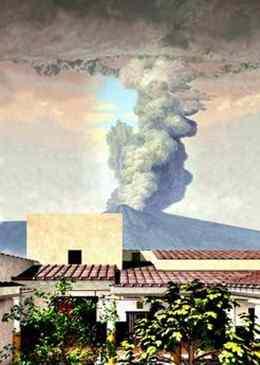Visitors to Pompeii will be encouraged to experience the eruption of Vesuvius more intensely this Saturday, with a one-off opportunity to explore an ancient house through touch, sound and smell only.
 Visitors entering the House of Julius Polybius will be blindfolded and led through the famous building by specialist guides from the Italian Union of the Blind. The hour-long tour will seek to recreate the final moments of those living there through senses other than sight.
Visitors entering the House of Julius Polybius will be blindfolded and led through the famous building by specialist guides from the Italian Union of the Blind. The hour-long tour will seek to recreate the final moments of those living there through senses other than sight.
The roar of the eruption of Mt Vesuvius, the screech of the wind, the howls and cries of animals and the voice of Julius Polybius will accompany visitors making their way through the building. The scents of bergamot and juniper, which once grew in abundance in the complex's inner garden, will permeate the house, while reconstructions of utensils and furniture found by archaeologists will be scattered around for visitors to explore through touch.
The special event at the House of Julius Polybius comes just months after the building reopened to the public this year following months of work designed to create an all-encompassing experience for visitors.
Part of a major overhaul at the renowned archaeological site, the reconstruction features Pompeii's first multimedia three-dimensional installation, as well as restored gardens and interiors. Visitors are now welcomed at the entrance to the house by a hologram of the house's owner, Julius Pobylius. The appearance of the wealthy freedman was reconstructed using scientific studies based on remains found at the site. Polybius's voice accompanies visitors in the most important rooms of his house, through to the final spot where he, his household and family took refuge at the time of the eruption.
The remains uncovered here by archaeologists included those of a pregnant young woman, who has also been restored to life in hologramatic form. The hour-long visit educates visitors about the building's architecture, wall decorations and furniture, as well as the plants and birds from its garden.
But it also places a special focus on the house's inhabitants, imagining their daily life and how they might have felt in the final moments of the eruption. Three-dimensional video digitally restores dozens of frescos, and there are virtual reconstructions of every room in the house, as well as an animation of the eruption and its impact on the building.
Saturday's special sensory experience, which requires advance booking but is free, marks the start of the Council of Europe's European Heritage Days initiative.
Source: ANSA [September 24, 2010]